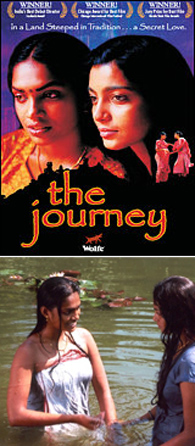Based on a true story and set in the contemporary but rural south Indian state of Kerala, The Journey, tells a love story between two girls Kiran (Suhasini Nair) and Delilah (Sruthi Menon) whose childhood friendship blossoms into adolescent passion.
Uncertain with Delilah's feeling toward her, Kiran "shows" her desires toward Delilah by agreeing to compose love letters on behalf of a male friend to pursue Delilah. Through these love letters, Kiran expresses her love toward Delilah who eventually discovers Kiran to be the true author of the letters. A magnificent but forbidden romance between the young women develops. Yet, their love couldn't survive without confronting the family opposition and local gossip. Besides the intriguing love story, the stunning rural landscapes and well-depicted local traditions of Kerala provide an impressing background setting for the audiences.

Pullappally in an intereview spoke about her concern about a growing phenomenon in Kerala where young women commit suicide after expressing their lesbian identity. While some stories were reported in the newspapers, many others have gone unreported because the family members were unwilling to reveal the real reason of their suicide. The US-based director hopes for the film to present a brighter image of queer young people and a more positive queer identity, unlike those pathologising images of gay and/or bisexual women in earlier Bollywood films such as Girlfriend which was condemned by queer activists for its homophobic and titillating depiction of lesbians.
The Journey is the first film out of India, especially rural India, addressing lesbian love and their challenges since Deepa Mehta's acclaimed Fire in 1996. Although Fire has increased the visibility and awareness of lesbian love relationships, the relationship between the two women (sisters-in-law) had evolved from their frustration of heterosexual relationship and marriage.
On the contrary, The Journey, the relationship between these two young women is about the choice of love. Disregard their very different class and religious background, Dililah comes from a Catholic middle class family while Kiran is more like a secular Hindu who adopts Hinduism more as a kind of life style than a religion, their love toward each other can transcend the difference because they choose each other out of love. This film also provides what Pullappally considers an authentic depiction of rural Kerala women. Even they don't have much access to resources and supports, they are not merely victims of their society, but women who have the strength to conquer the challenges they face in daily life and who have agency to change their lives at their will.
Although both Pullappally and Mehta are diasporic filmmakers, they have very different concerns and targeted audiences in minds. Not only is Fire made in a more urban setting, but it concerns more about women from the middle class in heterosexual marriages. The Journey stands out in its delicacy by depicting various sensitive issues with careful subtlety.

Another aspect to show Pullappally's delicacy is from the symbolic significance of the names of these two women. Delilah is a biblical character, which originally means a temptress, but it also means one who is uprooted from the roots. Growing up in a Catholic family, Delilah's running out of the church can be seen as her running away from her roots and her refusing to conform to these social and religious norms. Kiran is a name often given to boys in Kerala but sometimes it is given to both girls and boys in Northern India; and can be taken to suggest sexual ambiguity.
Since she left Kerala at age six, Pullappally has mostly lived in Chicago. Before she became a filmmaker, she was a public attorney, and later became a trial lawyer specialising in divorce, child support, and immigrant women who suffered from domestic abuses. After she won the Sunshine Peace Award for her exceptional devotions as an attorney advocating women's right and benefits, she returned to India in 2002 to shoot the film with the money that she received from the award.
The Journey has won the Chicago Award for Best Film and has toured the US widely. It also played to audiences and won several awards in eight major cities in India including Bombay, Trivandrum, Calcutta, New Delhi, etc. The local responses have been quite unanimous while outside Kerala, film critics and audiences have credited Pullappally for her exceptional work.
Despite being winning an award - the Special Jury Prize of the John Abraham Award - in Kerala, the film was only screened for a very short period and was not very well known locally.
According to a local professor who is also on the film board of a local TV station, Sreedevi Nair, he highlighted that people in Kerala tend to avoid award winners as they are commonly thought to be boring.
While people from the queer community have thanked her for addressing the significant issues they face, others have accused her of trying to turn local kids gay.
The Journey is truly one of the best films in Malayalam cinema. Not only does it explore the rare territory of young lesbian issues in Kerala, but also the director's sensitivity and compassion to deal with these issues. The film also provides positive images and encouraging strength of young queer women and leaves audiences with a sense of hope.
The writer is a PHD cadiate at the Centre for Research in Women's Studies and Gender Relations at the University of British Columbia, Canada.











 打印版本
打印版本










读者回应
抢先发表第一个回应吧!
请先登入再使用此功能。